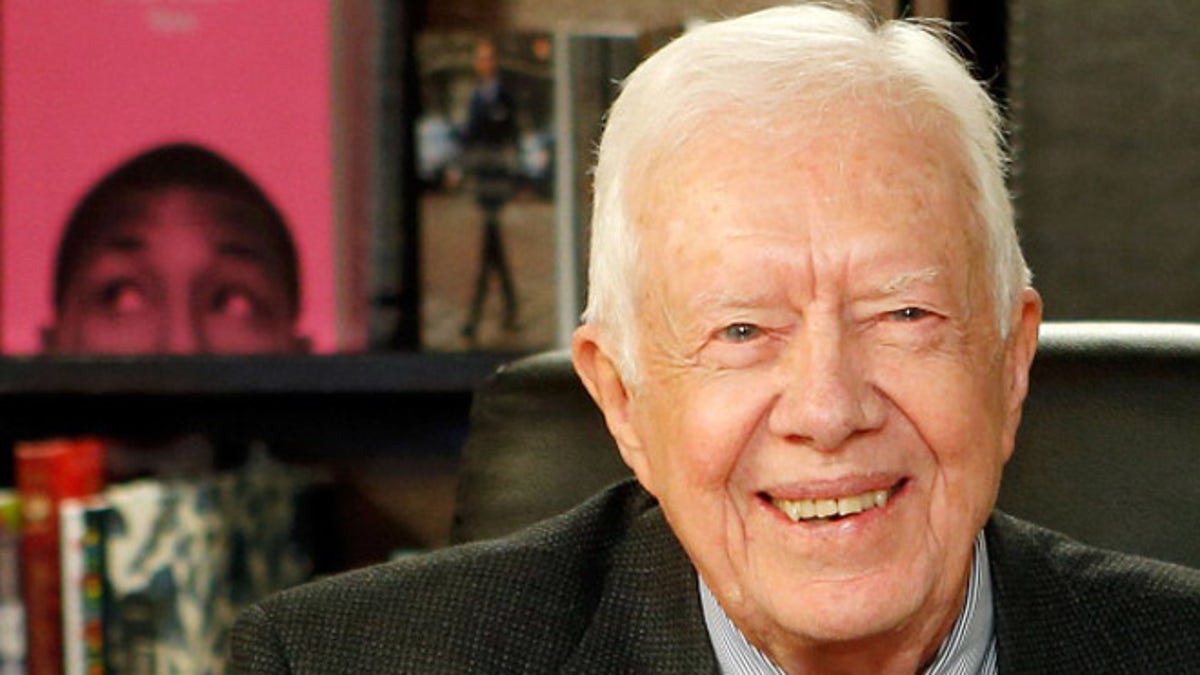
Former US President Jimmy Carter poses for a photo as he promotes his new book at Barnes & Noble, 5th Avenue on March 25, 2014 in New York City. (2014 Getty Images)
BOGOTA, Colombia (AP) – A pro-democracy foundation run by former U.S. President Jimmy Carter has shut down its 13-year-old electoral observation office in Venezuela as the South American country gears up for closely watched legislative elections.
In a monthly report on Venezuela's political outlook published Wednesday, the Carter Center said it closed its Caracas office May 31 to concentrate its limited resources in other countries that have solicited its help. It said it would continue to monitor events from the center's headquarters in Atlanta.
The Carter Center has been a frequent observer of elections in Venezuela and it mediated talks between the socialist government and opposition following a 2002 coup that briefly unseated then President Hugo Chavez.
But members of the Venezuelan opposition have long viewed its activities and access to the government with mistrust, a sentiment reflected in hard-liners' celebration of its departure on social media. Particularly irksome was the center's validation of a 2004 recall referendum won by Chavez amid complaints that the process leading up to the vote heavily favored the government and his 2012 declaration that Venezuela's election process was the "best in the world."
The Carter Center's departure comes as pressure is building on President Nicolas Maduro to invite outside observers for the important December legislative election that already has some on both sides talking of fraud by their opponents.
- Decay and government neglect: Tough lessons at Central University of Venezuela
- Best pix of the week
- Food shortages trigger violent looting in Venezuela, government blames the U.S.
- Venezuelan government bars opposition leader from holding public office, she claims
- Venezuelans being thrown in jail for tweets that criticize the government
- Jailed Venezuelan opposition leader ends hunger strike after country sets date for election
- Wife of Venezuelan opposition leader in 3rd week of hunger strike says they ‘won’t back down’
- Venezuelan makes history after becoming first transgender to run for office
For the first time in years, the opposition is heavily favored to win control of the National Assembly as voters fed up with triple-digit inflation, widespread food shortages and spiraling crime seek to punish the government. An opposition victory would likely set the stage for a recall vote against Maduro before his six-year-term ends in 2019.
The opposition accuses the government of trying to gain unfair advantage and abusing its authority by disqualifying the candidacies of several prominent critics and removing the leadership of a major party in its Democratic Unity alliance.
In turn Maduro charges that the opposition is hiding behind the cloak of democracy all the while preparing to disavow any unfavorable outcome and conspiring with the U.S. to oust him from power. The president has said repeatedly he will respect any ballot result but doesn't fear defeat since his side has won all but a single national election since Chavez kicked off the revolution 16 years ago.
"Venezuela isn't monitored and won't be monitored by anyone," Maduro snapped at journalists during a visit to the United Nations in New York last week when asked whether he would allow international observers.
The Organization of American States and European Union have both expressed interest in sending missions for the December vote and U.S. officials are also pushing for outside scrutiny to bolster acceptance of the results as a step in resolving the country's economic and political crisis. So far, Venezuelan authorities have only invited the less-experienced Union of South America Nations to observe the vote.








































